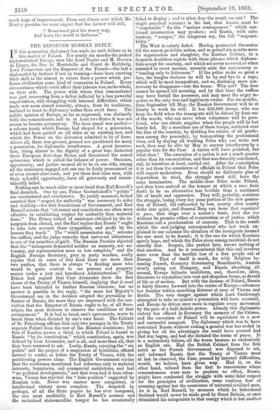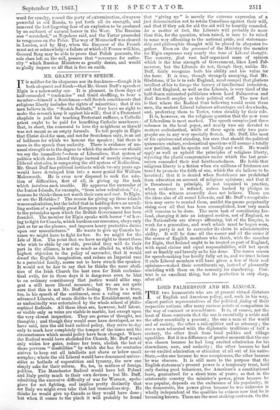THE REPORTED RUSSIAN REPLY.
IN this generation diplomacy has made no such failure as in this matter of Poland. For nearly six months the picked diplomatists of Europe, men like Lord Napier and M. Drouyn de Lhuys, the Due de Montebello and Count de Rechberg, Lord Palmerston and the Emperor of the French—the last a diplomatist by instinct if not by training—have been exerting their skill to the utmost to extort from a power which pro- fesses civilization some kind of concession to Poland. Every circumstance which could affect their labours was, on the whole, on their side. The power with whom they remonstrated was just recovering from a defeat inflicted by a less powerful organization, still struggling with internal difficulties which made war seem almost insanity, always, from its traditions, inclined to trust to diplomacy rather than overt force. The public opinion of Europe, so far as expressed, was distinctly with the remonstrants, and in at least two States it was not averse to become peremptory. The locus standi was perfect- a solemn treaty which Europe had obeyed for a generation, which had been quoted on all sides as an existing law, and which the Power on the defensive admitted to be of force. Above all, there was ground, ground not questioned for many a generation' for diplomatic interference. A great insurrec- tion, rising almost to the dignity of a great war, disturbed three European first-class States, and threatened the armed quiescence which is called the balance of power. Occasion, opportunity, and justice seemed all to be on one side, among all the statesmen engaged not one can be fairly pronounced as of even second-class rank, and yet these first-class men, with their splendid opportunity, have all grievously and unmis- takeably failed.
Nothing can be much abler or more lucid than Earl Russell's final despatch. One by one, Prince Gortschakoff's"" points" are encountered and overthrown. To justify massacre, hehad asserted that "respect for authority" was necessary to order and stability—the first foundations of Government, and Earl Russell retorts that "clemency and conciliation are often more effective in establishing respect for authority than material force." The Prince talked of assistance obtained by the in- surgents from abroad, and the Earl replies that Russia "ought to take into account these sympathies, and profit by the lessons they teach." The "world assassinates me," screams the ruffian, and the judge remarks that universal abhorrence is one of the penalties of guilt. The Russian Premier objected that the "insurgents demanded neither an amnesty, nor au- tonomy, nor representation more or less complete,' and the English Foreign Secretary, grey in party warfare, coolly rejoins that in eases of this kind there are more than two parties, that there is always "a floating mass who would be quite content to see persons and property secure under a just and beneficent Administration." The Prince had argued that Czar Alexander drew the first clause of the Treaty of Vienna himself, implying that it must have been intended to further Russian interests; but no answer is possible to the reply, "the more her Majesty's Government see in the decision adopted the prevailing in- fluence of Russia, the more they are impressed with the con- viction that the Emperor of Russia ought to be, of all Sove- reigns, the most desirous to observe the conditions of that arrangement." It is bad to break one's agreements, worse to break them when dictated by one's own hand. The Cabinet of St. Petersburg affirms that only two passages in the Treaty separate Poland from the rest of the Russian dominions; but that of London quotes a third, in which Poland is bound to Russia "by its constitution," which constitution again, was defined by Czar Alexander, and is all, and more than all, that they have ventured to ask. Lastly, Russia, rejecting the " six points" and the project of a suspension of hostilities, offered instead to confer, as before the Treaty of Vienna, with the partitioning powers alone. The English Government rejoins that the conference mentioned had reference only to material interests, boundaries, and commercial restrictions, and had "no political developments," and that even had it been other- wise, Vienna has rejected the "false position" suggested by Russian wile. Never was answer more categorical, or intellectual victory more complete. The despatch is, perhaps, of all the State papers he has ever composed, the one most creditable to Earl Russell's acumen and the restrained statesmanlike temper he has occasionally failed to display ; and to what does the result amount ? The single practical sentence is the last, that Russia must be " responsible" for the "serious consequences" which con- tinued insurrection may produce; and Russia, with calm hauteur, "accepts," the telegrams say, the full "responsi- bility."
The West is calmly defied. Having protracted discussion till the season prohibits action, and so gained six manths more for organization and slaughter, the Russian Cabinet, in a despatch doubtless replete with those phrases which diploma- tists accept for courtesy, and which are never so sweet as when intended to cover menace, serenely ends the controversy as "tending only to bitterness." If the police make so great a fuss, the burglar declares he will be by and bye in a rage, which will be most inexpedient, and so, declining more con- troversy he disappears—into the house. Why not? The door cannot be opened till morning, and by that time the ruffian may have buried the possessor, and may meet the angry in- quirer as the only true and legitimate owner. For six months, from September till May, the Russian Government will be at liberty to work its will. It has 250,000 troops, who can keep the field when the insurgents will be driven by frost out of the woods, who can move when volunteers will be para- lyzed, who can obtain supplies when the people will be but barely fed. By a merciless use of these troops, scattered over the face of the country, by dividing the estates of all gentle- men among the peasantry, by transporting the professional class, and by slaying all working Poles who can write and. read, they may be able by May to answer interference by a popular vote for the Czar. A nation will have perished, but what then ? The execution of a nation is not a much greater crime than its emasculation, and that was formally sanctioned, and, in intention at least, carried out. After the conscriptiom it is not from the conscience of officials in Poland that Poles will expect moderation. Even should no deliberate plan of deportation be tried, the struggle must still have the same termination. The middle-class Poles make Poland, and they have arrived at the temper at which a race feels death to be an alternative less terrible than a continued. life of insult and oppression. They will, probably, continue the struggle, losing every day some portion of the new genera- tion of Poland, till exhausted by loss, county after county sinks into quiet, and General Berg can issue that requiescat in pace, that dirge over a nation's tomb, that dies ins without its promise either of resurrection or of justice, which Russians call a proclamation of amnesty. That is the result. which the cool-judging correspondent who last week ex- plained in our columns the situation of the insurgents deemed the one most to be feared ; it is the one for which Russians openly hope, and which the Poles alone among mankind do not secretly fear. Despair, like perfect love, knows nothing of that emotion. And be it remembered that this end involves more even than the terrible loss of a free people out of Europe. That of itself is much, for with Belgium be- coming French, Germany threatening Scandinavia, Austria slowly eating out Hungary, and Russia 'absorbing all around, Europe hitherto multiform, and, therefore, alive, threatens to crystallize into vast and shapeless forms, as devoid of life as of motion. But with the decease of Poland, Russia is fairly thrown forward into the centre of Europe—advances her frontier within marching distance at once of Vienna and Berlin. The very danger against which Lord Castlereagh attempted to take so cynical a precaution will have occurred, and Europe be driven once more to regulate every movement by the pace of a half-Asiatic power. Already this diplomatic victory has effaced in -Germany the memory of the Crimea, and the execution of Poland will be equivalent to a new and sucoessful conquest. The diplomacy which was to have restrained Russia without risking a general war has ended in giving her all the advantages she could have secured had that war begun, and had she dictated the terms of peace. It is a melancholy failure, all the worse because so exclusively an English one. Had the British Cabinet from the first acted as the French Government was disposed to act, and informed Russia that the Treaty of Vienna must at last be observed, the Czar, pressed by internal difficulties, would, we believe, have given way. Had it, on the other hand, refused from the first to remonstrate where remonstrances were sure to produce no effect, Russia might have conducted the struggle with some faint respect for the principles of civilization, some cautious fear of arousing against her the conscience of universal civilized man As it is, Earl Russell, by menaces which he beforehand declared would never be made good by Great Britain, at once stimulated his antagonists to that energy which is but another word for cruelty, roused the party of extermination, always so powerful in old Russia, to put forth all its strength, and removed the last lingering fear of an explosion to be produced by an outburst of natural horror in the West. The Russian was "scratched," as Napoleon said, and the Tartar proceeded to vengeance on the Poles. The way of Mouravieff was cleared in London, and by May, when the Emperor of the French must act or acknowledge a failure at which all France will hiss, General Berg may be able to prove that Polish peasants, the sole class left ou the soil, possess that "reverence for autho- rity" which Russian Ministers so greatly desire, and would so gladly impose on all that is free on earth.































 Previous page
Previous page